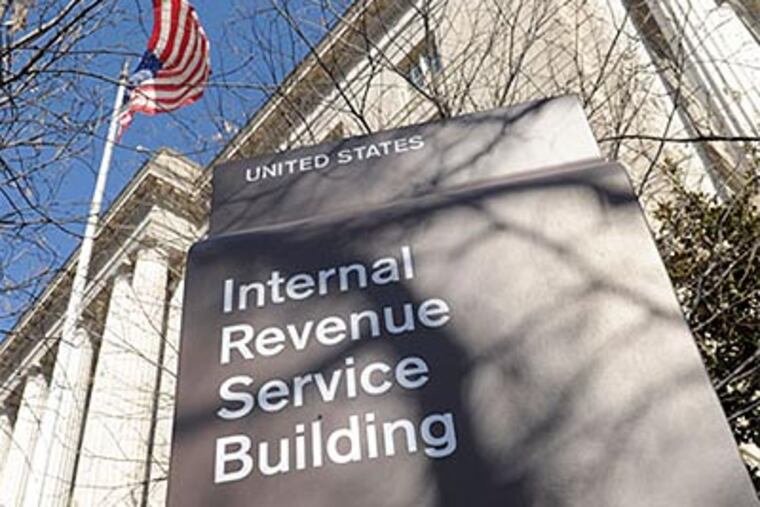The Pulse: At the IRS, wrong, but maybe explainable
First the easy part: No one from the Internal Revenue Service should ever have singled out any applicant for disparate treatment based upon party affiliation or ideology. And never should IRS officials have scrutinized only one end of the political spectrum, which in the case of the current scandal involves targeting groups that use the words tea party, patriots, and 9/12 project in their names.

First the easy part: No one from the Internal Revenue Service should ever have singled out any applicant for disparate treatment based upon party affiliation or ideology. And never should IRS officials have scrutinized only one end of the political spectrum, which in the case of the current scandal involves targeting groups that use the words tea party, patriots, and 9/12 project in their names.
More difficult, thus far, is figuring out why it happened.
On Wednesday, USA Today reported that, in the 27 months the IRS put a hold on tea party applications for 501(c)(4) status, it approved applications from similar liberal groups. That certainly sounds nefarious, and politically motivated.
Unfortunately, the report of the Treasury Inspector General for Tax Administration did not offer details on the human factors behind the controversy. It did say that, in the spring of 2010, the Determinations Unit of the IRS in Cincinnati implemented a "Be on the Look Out" list, which was used to screen for conservative-sounding groups.
According to CNN, the IRS recently identified two "rogue agents" in the Cincinnati office as the primary culprits for mishandling the applications from conservative groups.
Joseph Grant, commissioner of tax exempt and government entities, wrote in response to the IRS report that the employees responsible for this action owed their behavior to inefficient management rather than bias. He said, "We believe the frontline career employees that made the decisions acted out of a desire for efficiency and not out of any political and partisan viewpoint."
Grant's comment suggests to me the possibility of a rather benign explanation, albeit one that is still unacceptable.
Sure, it remains entirely possible that a team of specialists who review such files sought to thwart conservatives in a politically charged world. If so, they need to be punished, including a criminal prosecution if it is determined that any laws have been broken. But I doubt that's what happened.
The IG report says that, over four years, there was almost a doubling of applications for 501(c)(4) status. It's important that applications be scrutinized so the IRS, in the public interest, assures itself (and taxpayers) that groups seeking not-for-profit status for acting in the social welfare are not, instead, primarily political entities.
In 2009, the IRS received 1,751 applications; in 2012, the number had grown to 3,357. I'd be surprised to learn that there was a corresponding increase in resources to evaluate the applications at the Cincinnati office. More probable is that staff members were overwhelmed, and clumsily developed a shorthand way of slowing certain types of applications, which superficially seemed to necessitate additional scrutiny, while approving others. Of course, it certainly does not help that the IRS's policy on determining 501(c)(4) status is extremely vague. The method? To segregate applications for entities that were pledging not to be primarily political but which had political-sounding names.
On Friday, during testimony before the House Ways and Means Committee, Steven Miller, the acting IRS commissioner who was just forced out of his job, said the employees were not motivated by partisanship. That conclusion was echoed by J. Russell George, who wrote the IG report. Miller called the approach by employees "foolish mistakes" by people "trying to be more efficient in their workload."
The mistake in this scenario was not applying the same standard to groups with progressive or other liberal-sounding words in their names.
It seems to me that if you are seeking a status from the IRS as an entity not primarily involved in politics - and you have a name that suggests otherwise - you should be subject to scrutiny. I shared my thinking with Marcus Owens, who from 1990 to 1999 oversaw tax-exempt groups for the IRS. He now represents groups seeking not-for-profit status.
He told me that the Cincinnati office has to deal with everything from the neighborhood swim club to hospital-system mergers, and, occasionally, organizations masquerading as something they are not. He noted that the last election cycle generated a number of not-for-profit applications from organizations that had many characteristics of political entities, rather than groups advancing social welfare, which is the definition of a 501(c)(4).
"I think there's an underappreciation of the enormity of the task that this field office of the IRS has to undertake, a failure to appreciate exactly how difficult it is to deal with a large number of organizations," Owens said. "A second sort of underappreciated aspect of this . . . is that these organizations . . . require a more careful analysis. These are not Little Leagues and PTAs; these are organizations that were formed at about the time of an election that were using language that suggested they were analogs to political parties, which doesn't qualify under section 501(c)(4). . . . These organizations, for better or worse, are ones that I think the average citizen actually would expect the IRS to pay close attention to. Not necessarily adverse, but certainly close attention."
I proposed a different scenario. Namely, imagine the IRS in Cincinnati was just rolling over, despite the political nature of the names of groups, and then later we found out that these organizations were, in fact, blatantly political. We'd be asking, Why was the IRS asleep at the switch?
He agreed. "The issue is not that the IRS shouldn't have been looking at these groups," Owens said. "The issue is they really should have used a more effective means of identifying them than just the nomenclature and the name, because they may or may not indicate anything."